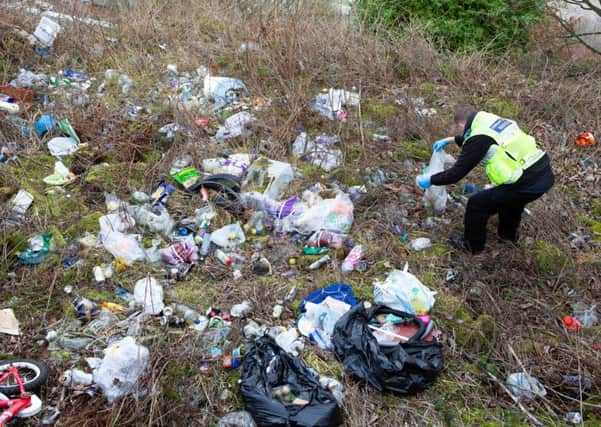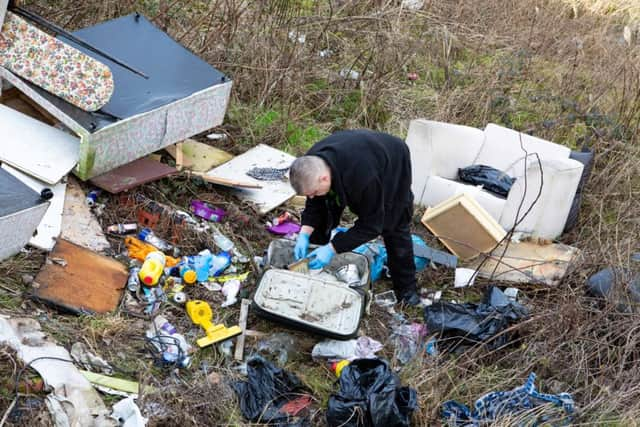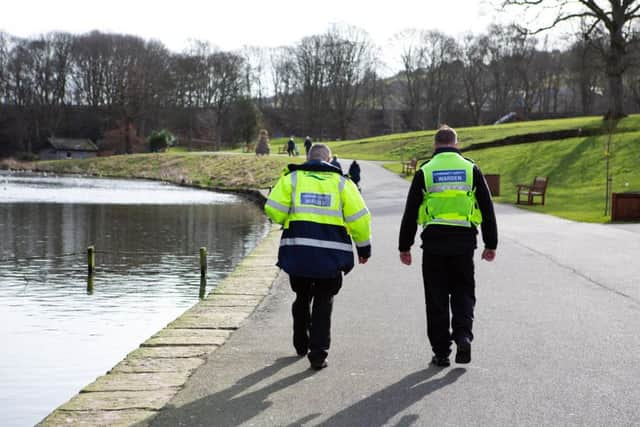A day in the life of Calderdale Council’s Community Safety Wardens


The decision involves closer working relationships, joint training and an increase in community safety wardens, and aims to make the most of the council’s decreasing resources and budgets.
To gain an insight into the department, reporter Tom Scargill followed staff on their work in the borough.
Advertisement
Hide AdAdvertisement
Hide AdCommunity Safety Wardens are the public face of the council.


They began patrol in November 2017 and are a 24-hour resource, doing everything from issuing fixed penalty notices for dog fouling to helping homeless people off the streets.
If somebody calls the council’s emergency number out-of-hours, the wardens will respond to the report and gather the relevant information ready to be dealt with in the morning.
Craig Heywood and Mick Hall are two of 15 - soon to be 20 - wardens, and have worked together for the past year, doing everything from breaking up drunken fights on Friday nights to administering first aid to the public.
Advertisement
Hide AdAdvertisement
Hide Ad“We’re there to fill in gaps. We liaise with the police, social services’ emergency duty teams, all different services,” says Mick, who worked in the prison service for 20 years and is FPOS (first person on scene) trained.


“It takes the pressure off the ambulance service because we can treat minor injuries and send them on their way, freeing ambulances up.
“We’re not the police, and we don’t have their powers, but we’re a presence, we’re in hi-viz jackets, so people who might be getting rowdy after a few drinks might see us and disperse.
“We have stopped a few fights. But we can also free up the police to concentrate on other things.
Advertisement
Hide AdAdvertisement
Hide Ad“He (nodding towards Craig) spots dodgy cars from miles away, when I can’t even see them.”
“I can just tell,” says Craig, who previously worked in civil enforcement, “either by the make, the driver, the way they’re driving.”
“I just see it as low level policing, we’re their eyes and ears.
“We’ve seen murders, suicides, lots of stuff. We’ve solved a lot of stuff too through intelligence gathering, just by talking to people.
Advertisement
Hide AdAdvertisement
Hide Ad“You also learn people’s habits, learn when something’s about to kick off by reading their body language.
“If you see someone you know who’s a wrong ‘un, you just say ‘you alright?’, just to let them know you’re there, and it works.”
Craig and Mick say the wardens’ camera van has been a major help, in reaching places in the borough not covered by CCTV, which is monitored 24/7 at a location in Pellon, from where wardens can be directed to possible incidents, and where an ANPR camera can also be seen.
Craig and Mick’s radios are linked to most of the major retailers in the town, who will contact them with any suspicious activity, particularly regarding possible shoplifters, who the pair can then monitor around town.
Advertisement
Hide AdAdvertisement
Hide AdThe pair had six calls in one night regarding threatened suicides at North Bridge or the flyover.
“You have to take every one seriously. The sixth one could go through with it,” says Craig.
Fly-tipping is a continual battle for the council, with the wardens often first on the scene.
And the scene that awaits us on a steep embankment in Pellon is an ugly mishmash of gym equipment, fridges, children’s toys, chests of drawers, bed frames, mattresses, ironing boards, suitcases, chairs and general littùer, all dumped here because it’s out of the way, on a back street only covered by privately-owned CCTV
Advertisement
Hide AdAdvertisement
Hide AdMick and Craig immediately look for letters, receipts, anything that tells them who has dumped the rubbish. Any evidence will be passed on to Environmental Health, who will then pursue prosecutions.
“You have to be careful where you put your fingers for needles or syringes,” says Mick as he searches through the mess.
“The ironic thing is, the tip’s only over there,” says Craig, pointing into the middle distance only a mile or so away.”
“A lot of it is people paying other people a tenner to take rubbish away, and they just dump it,” says Mick.
Advertisement
Hide AdAdvertisement
Hide Ad“Yet it’s a fiver to take a mattress to a tip,” says Craig. “There’s no sense to it is there?
“But we’re watching, and we will catch them, so it’s not worth it.”
Night-time patrols include catching up with the borough’s homeless, who Craig says tend to sleep in the covered shelter of Broad Street Plaza, which is closed off on a night-time and has no security.
“Nine times out of 10 it’s the same people,” he says.
“We’ll take some of them into Customer First,” says Mick, “and as soon as we go, they’ll leave.
Advertisement
Hide AdAdvertisement
Hide Ad“So we sit with them through the whole process because we’ve learned that if we walk away, they’ll leave.”
Mick estimates there are about five genuinely homeless people in Calderdale at the moment.
“You see beggars in town, but a lot of them have got accommodation, which we’ve helped set-up.
“But some of them are alright. We’ve had ex-soldiers who we’ve helped - once you get them sorted you never see them on the streets again.”
“We have to liaise with housing to see if they have accommodation, because some do and some don’t,” says Craig. “Those that don’t get priority.”